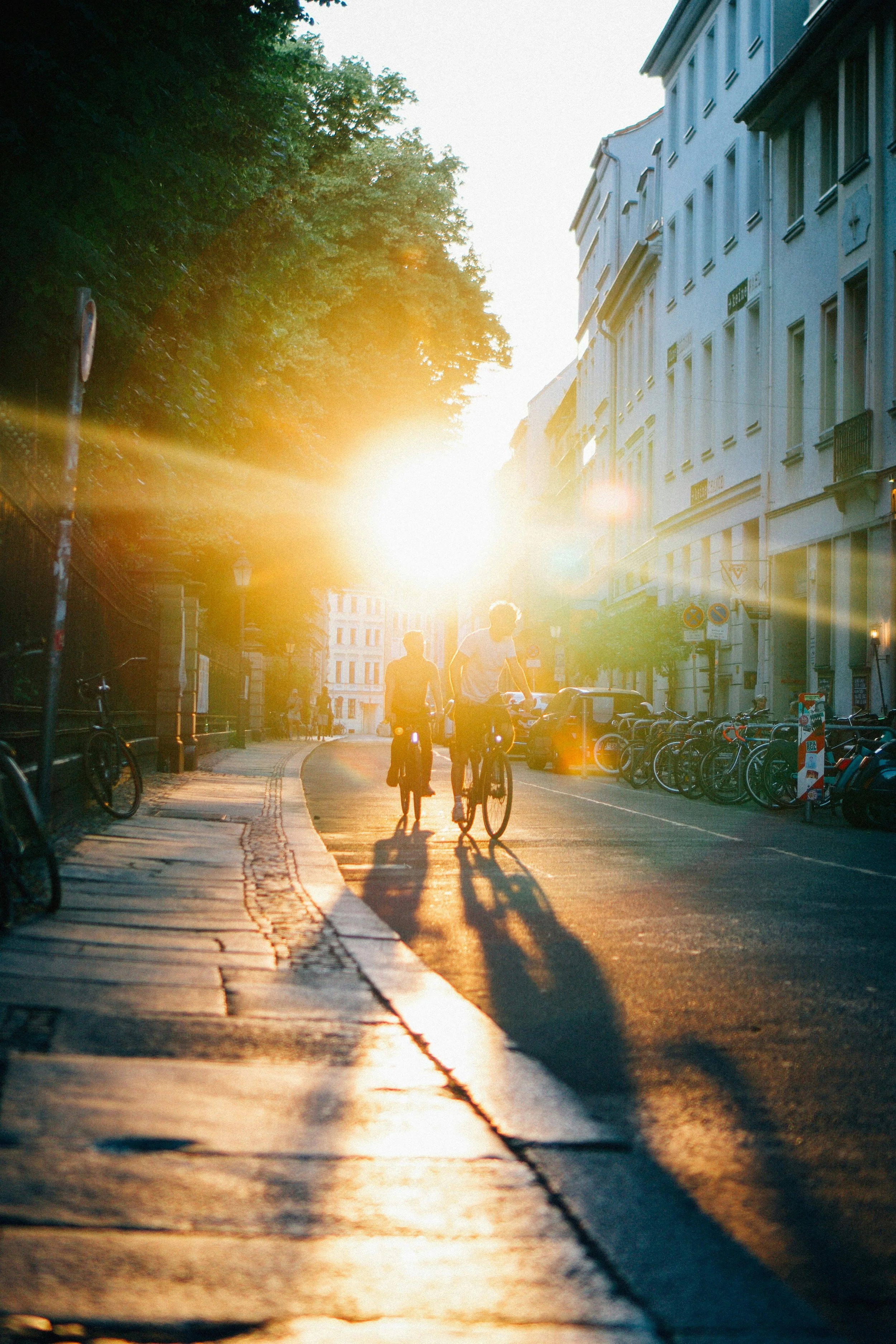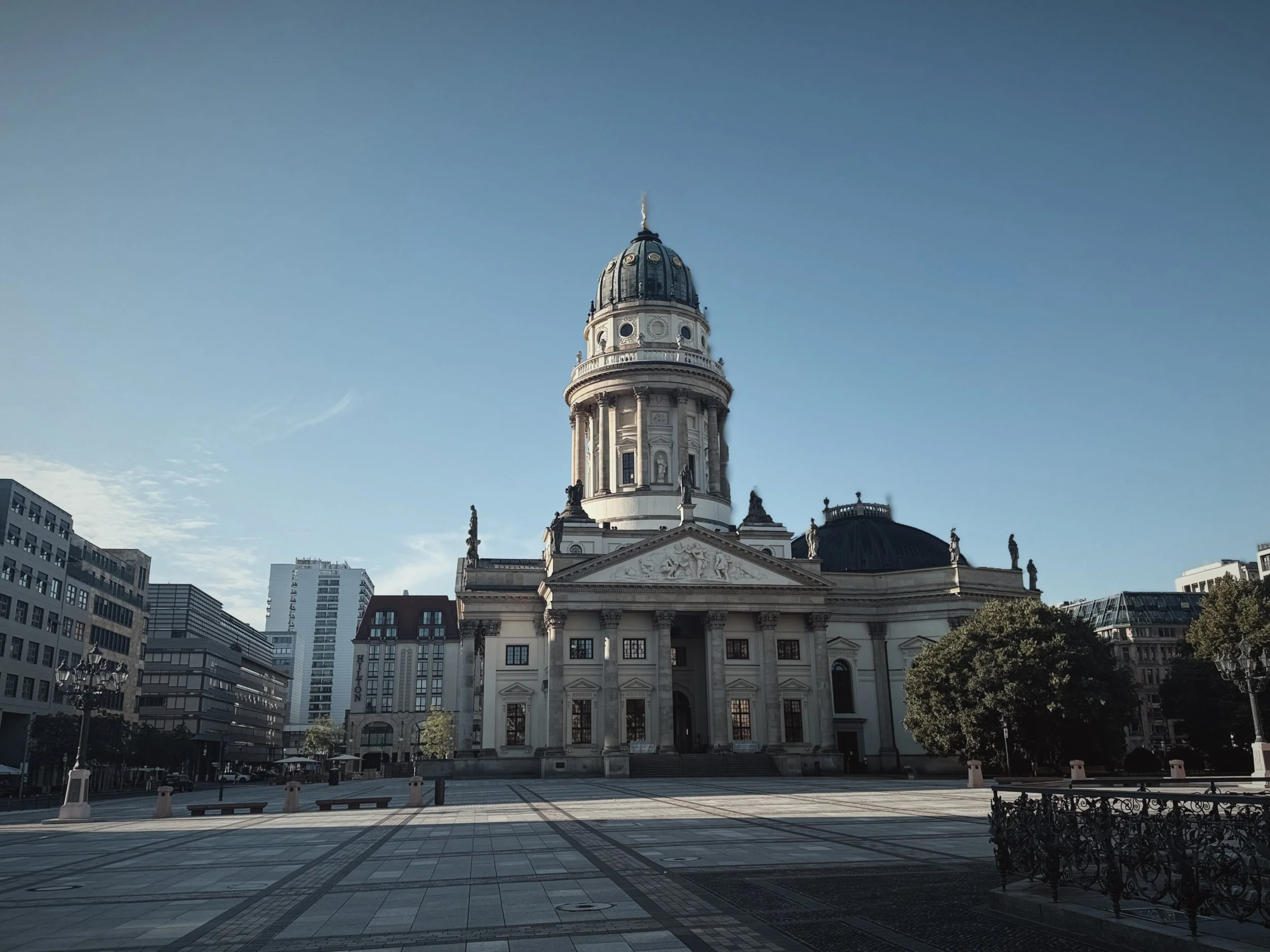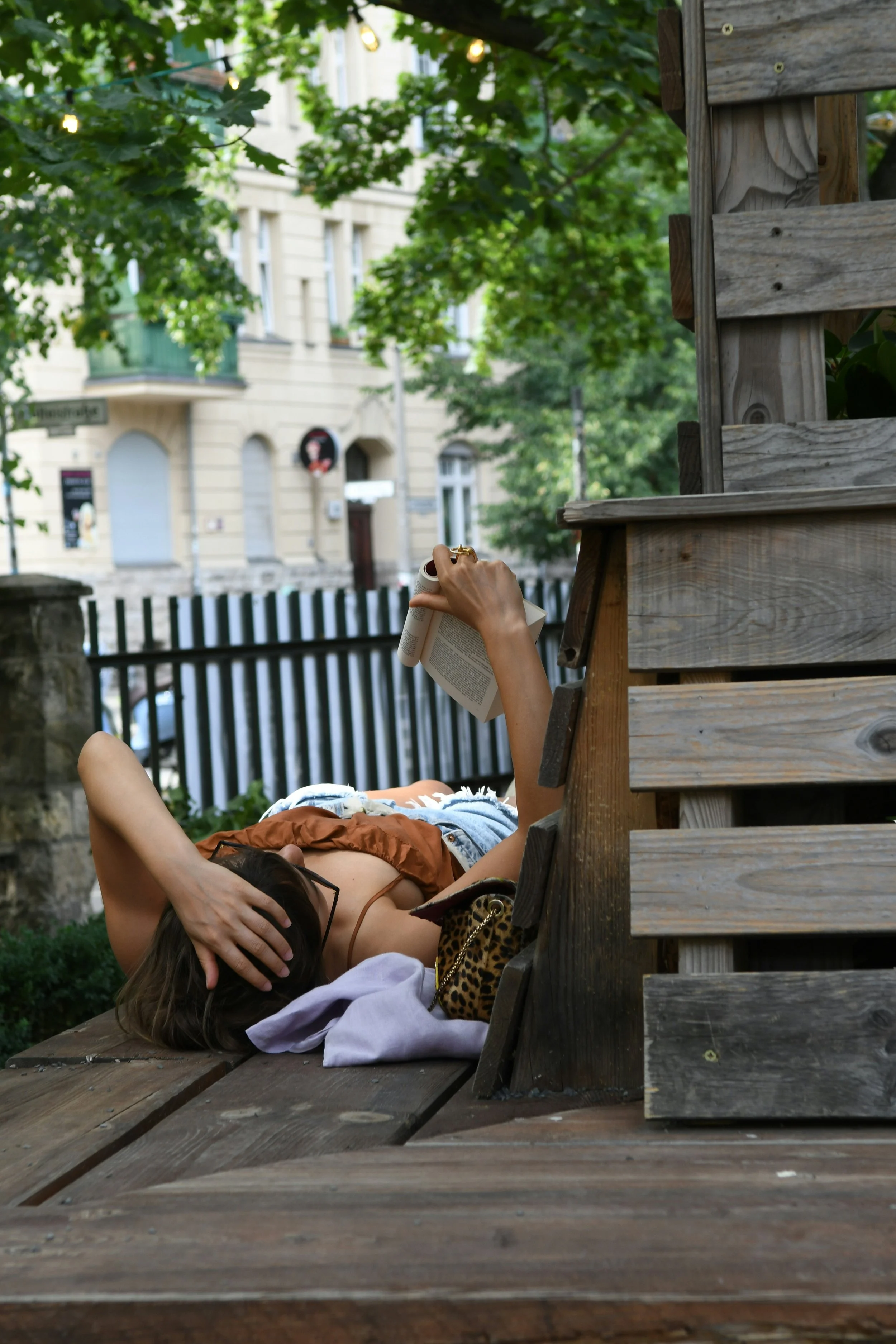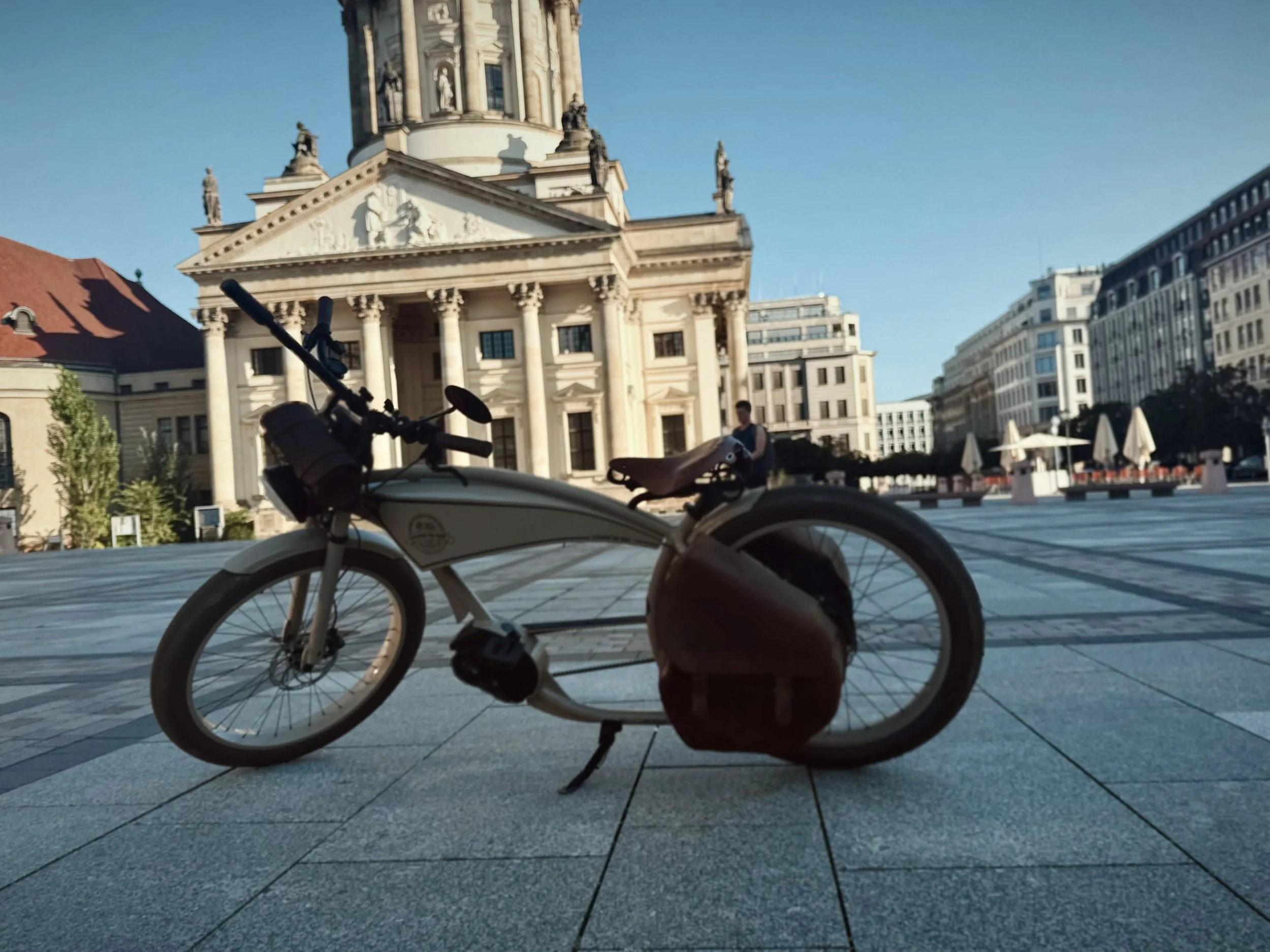Ruffian in Berlin
Four Days: A Gentleman soon in Berlin
Every folly begins, as already proofed, with a cup of coffee. There I sat, in my armchair, contemplating the map as though it were a polite board game. “From Hunsrück to Berlin? Why, a trifle! Four days of 170 kilometres each — eight to nine hours in the saddle, nothing more than a gentleman’s constitutional.” So I spoke, as if I were Caesar crossing the Rubicon and not a man in waistcoat and jacket whose posterior complains after a tram ride.
Armed with this lethal cocktail of overconfidence and sartorial stubbornness — for what sensible man chooses gentleman’s attire for a feat of endurance? — I embarked upon my expedition.
Day 1: The Enthusiast’s Lie
The skies above the Hunsrück were bright, the breeze obliging, and I mounted my bicycle with the grace of a man who believes Berlin to be but a village or two away. The first kilometres were splendid. Cows looked on with quiet contempt, farmers tipped their caps, and children pointed, no doubt wondering why a travelling duke in waistcoat had forsaken his carriage for two wheels.
By kilometre sixty, however, the rebellion began in my thighs. By eighty, the saddle itself staged a coup. I bribed my body with Apfelkuchen at a village bakery — a holy relic consumed as though it were ambrosia. The locals examined me as one might regard an exotic parrot who has wandered into a chicken yard.
When evening came, I collapsed into my quarters with the dignity of a chandelier falling from its chain. Day one was technically a victory, but only in the way a man survives his own duel.
Day 2: Rain, the Great Equalizer
Day two dawned with false promise and ended in drizzle. Not heroic rain — no thunderous Wagnerian storm — but that persistent drizzle which creeps into collars, cuffs, and self-respect.
My polished shoes soon became aquariums; my jacket, a travelling sponge. Farmers watched from under awnings, some even waved, though whether in sympathy or ridicule I could not say.
Lunch was taken in a tavern where I entered like a half-drowned baron dragged from his moat. The innkeeper, well-versed in eccentric clientele, wordlessly served bratwurst and potatoes. My fellow patrons — stout men with boots large enough to house families — regarded me with the polite silence reserved for lunatics.
The afternoon was penitential: blurred villages, soggy lanes, and the saddle’s steady harassment. Yet beauty appeared even here — sunflower fields bowing like defeated courtiers, dripping lanes that seemed doorways into purgatory. Still, by evening I dismounted like a collapsing chandelier for the second night in a row, dripping, battered, and perversely proud.
Day 3: Conversations with the Saddle
By day three, the saddle had ceased to be an object. It had become interrogator, philosopher, tormentor. “Why do you persist in this absurdity?” it demanded at every bump.
The morning passed in deceptive calm, mist softening the villages into tapestries. For a brief stretch, I even imagined myself capable. But by kilometre sixty, the interrogation resumed. By ninety, it was full torture.
At a bakery I devoured pretzels and quiche, the fare of a desperate exile. When I told the baker’s daughter my destination — “Berlin” — she laughed. Not cruelly, but as one laughs when a child insists he will build a castle from breadcrumbs.
The afternoon descended into opera. My legs the weary orchestra, the saddle the tenor screaming pain. Villages blurred: half-timbered houses, indifferent fountains, cobblestones rattling through me like artillery fire. By the eighth hour, my jacket clung like a wet flag at half-mast, my shoes squeaked like frogs, my waistcoat attempted permanent union with my skin.
I arrived that evening not as a rider but as a ruin that happened still to move. The saddle had won the argument; I had won geography.
Day 4: The Fool Arrives
The final day began without hope, only a courtesy nod to destiny. My legs resembled boiled asparagus, my posterior a medieval medical case study. Yet Berlin demanded attendance, and a gentleman answers, even when he should not.
The first fifty kilometres I was buoyed by visions: boulevards, cafés, the hush of an exhibition hall. But by eighty the saddle resumed its interrogation: “Why Berlin?” “Because I said I would,” I replied silently — the anthem of all fools.
Lunch was schnitzel the size of a province. I attacked it as if armed with treaty rights, while locals eyed me like a pheasant that had inexplicably wandered indoors.
The afternoon dragged like a trial. My clothes were heavy, my shoes squealed, and my very shadow looked exhausted. And then — suddenly, gloriously — Berlin. Not triumphant fanfare, but weary relief. Traffic scorned me, pedestrians ignored me, yet I had arrived.
My prize awaited: a photography exhibition, silver gelatin prints glowing in stillness. Among those images of light and shadow, my suffering found its justification.
“Yes,” I thought, “this was worth it.” And immediately after: “Never again.”
Epilogue: A Gentleman’s Vow
Thus ended four days, 680 kilometres, and the illusion that this was ever a good idea. Sustained by Apfelkuchen, pretzels, schnitzel, and the sheer unwillingness to admit defeat, I stumbled into Berlin with nothing left but a story.
A tale to be told, embellished, laughed at — and never, under any circumstance, repeated.
Until, of course, the next cup of coffee whispers another dangerous idea.







